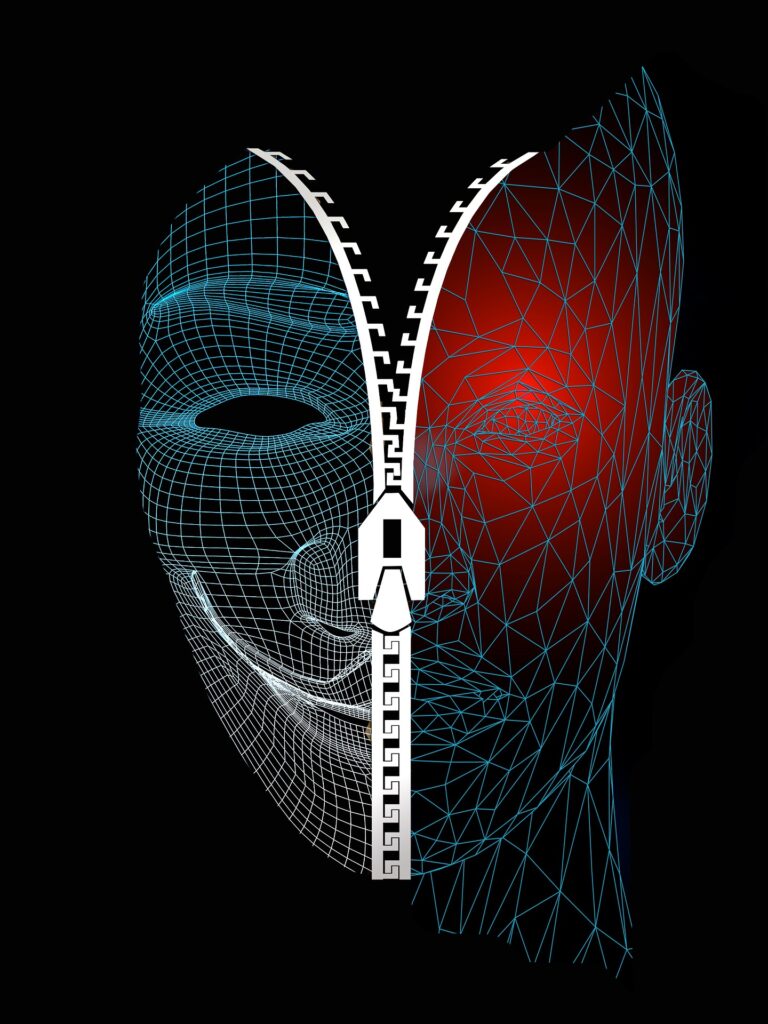by Del Hungerford
When you hear the words “step into your identity in Christ,” what is that truly saying? By definition, identity means that you are yourself and not another. It’s a condition or character of each individual person – who they are, what they believe, and other qualities that make us each identifiable from others. So, when the Word tells us that we’re a new creation in Christ, our identity is now with Him and the more time we spend with Him, the more we become like Him and identify with what He does, says, and acts like.
Here’s the problem… because of trauma and life circumstances, we often struggle with truly knowing who we are. We take on an identity that others have put on us. It’s pretty hard to identify with Christ if we can’t be secure in who are created to be. It’s going to be hard to step into Christ’s identity if we are negatively affected by the world around us.
Growing up, I was a show-off. I did dumb things to get people to pay attention to me. I now call that an “A.G.D.” (attention getting device). I can laugh at some of my silly antics now but at that time, I was pretty serious about needing some major attention. My goal (unconsciously) was to get people to affirm me as a person. Most of the time, that backfired because how I went about it was rather annoying. I’ll spare you the details but I’m sure if we’re all honest, we all relate on some level. My issue was my lack of being comfortable in my own skin; I didn’t like ME.
I spent a lot of time with college students in a variety of situations (teacher, fraternity cook, house mother at a sorority, etc.). So many of the conversations centered around what others thought of them. If someone said a mean thing, for many, it was devastating. Imagine if Einsten or Tesla took all the negative comments thrown their direction when they came up with new ideas. Hmmmm.....
In recent years, it's like any negative comment is an attack on the identity. Most recently, many have come to talk with me who battle anxiety, depression, and other emotional things. These issues appear to keep these people from having a normal functioning adult life. Many struggle with “adulting” in general. When we get overwhelmed, life itself tends to throw curve balls at us. We then get hit with those curve balls and think there’s no way out because we listen to what society tells us.
It's interesting that these types of issues began to escalate somewhere around 2012. Why was there such a spike in mental health issues? As a teacher, I noticed that by the time I retired (2022), HALF of the students in my classes were on some sort of plan to manage their mental health. I have some theories about the "why" of these issues but will save my comments for personal rather than public discussion at this point.

News flash #1 – When people are mean, nearly 100% of the time, it’s their own issue and they are simply projecting their own hurt at you! Hurting people hurt people. Once we become comfortable in who God created us to be, nasty comments have less of an effect on us. But, that’s easier said than done.
Why? Because when people say nasty things, we like to “entertain” those little nasties, mulling them over and over in our minds. The more we do that, the more stirred up we get. I wonder what would happen if we did this more often with the compliments people give us? I can’t seem to figure out why it’s the negative comments that get the most “mind attention.”
Everyone on the face of the earth has had trauma of some kind. At some point, we have a choice in how the events of those traumas rule our lives. The process of choosing an alternative takes consistency of practicing new thought patterns. In other words, we need to dwell on the opposite and let who God says we are become the ruling force in our lives. There was a time where I had note cards of scriptures pasted all over my bedroom as a child so my focus was the words of God’s promises and not on the circumstances. We are told to give thanks IN everything but not FOR everything. (I Thess. 5:18) When we learn to put our focus on the good and Holy things, then, and only then, do we even stand a chance of overcoming the traumas that can plague us. When we keep our eyes on Jesus and put into practice what He says about us, it’s easier to focus on the good and holy things.
News flash #2! The road will have twists and turns. It’s gonna take time and persistence of being consistent to learn how not to pay attention to the negative crap that comes at us all the time. Even in the midst of some of the slimiest stuff, we can still be in a place of rest. It’s a choice. It’s easy to be offended but, that’s a choice, too. We live in a society where people look for opportunities to be offended. We seem to feed off the latest and greatest disasters and bad news by calling the “bad guys” every name in the book or complaining how the situation has ruined our lives, etc. Maybe it might be more worth our while to pray in our prayer language over those situations and release blessings to all those involved.
What does any of this have to do with our identity in Christ? Well, everything. The reason? We get so wrapped up in what others think of us. Why? It's because we tend to look to the world for affirmation or approval rather than believing what God says about us. We're too sidetracked by the things of the world which keeps us from moving forward out of fear. It's the "what will people think about me?" syndrome that is a destiny killer.
We think because bad stuff happened to us, we’re of no use to God. We believe lies that keep us from moving forward (I’m not good enough, I can’t do that, no one will notice so why bother, etc.).
I really do like the story of the little engine that could. All the way up that entire mountain, his words were “I think I can… I think I can” and it wasn’t easy. But, he kept his eyes on the top of the hill – that hard place that he knew if he could only get to, things would be much easier.

News flash #3 – If we can’t develop a sense of our own identity and be comfortable with who we are created to be, it’s going to be rather difficult stepping into our identity in Christ. How do we adjust our paradigm in this area? Glad you asked! First of all, this thing called “practicing” is key. You put before your mind what you know to be true. This is what the Word calls "renewing your mind." And, when those little familiar spirits start whispering nastiness into your ear, turn your ear towards what God says about you or that situation. If you don’t know, find scriptures to stand on about who you are in Christ. Turn them into declarations and speak them over yourself several times per day.
What’s a familiar spirit? It’s a voice in your head (your thoughts) that tells you junk that’s contrary to God’s Word and His thoughts about you. These little "familiars" go after all of us because they know that if they can wear us down, they win and we don’t get to move forward. That’s their job. Not that we pay attention to them (which we shouldn’t) but if we “take that thought captive” (II Cor. 10:5), what’s being whispered, or flashes across our the eyes of our imagination, it won’t take root and develop into a nasty thought process, imagery, or action in our lives. But, like anything else, it must be nipped in the bud before it takes root. Once the root is developed, it’s much more difficult to deal with.
For us to truly step into our identity in Christ, we need to see ourselves as Christ sees us. This requires getting rid of the junk that pollutes our minds and actions. This requires "heart-brain coherance" where the brain (soul) comes into agreement with the heart (spirit). It’s like cleaning up after a tornado or hurricane where there are heaps of smelly things strewn about. It takes our whole lives to get where we are today so we can’t expect that over night we’re going to clean it all up. Wise counsel, spending time with the Father so He can show us what needs work, and practicing new habits are all a part of the clean-up process. Also, please note, when we spend time with the Father, Jesus, and the Holy Spirit, many things happen organically because we are being changed from the inside out. In building that intimate relationship, our paradigms change and so will our actions.
As mentioned above, we all have stuff in our lives that tries to pull us down. I’ve known people that have had horrendous childhoods that have come out of that experience and live normal happy lives. Others who still dwell on trauma and what it’s done to them, they can hardly function. What’s the difference? From my personal observation, it’s all about a choice to move beyond trauma and life difficulties. Even with major mental issues, I believe there is a way out. It starts with a full understanding of who we are “in Christ” and taking on His identity. But, in order to do that, we must learn to let go and forgive, learn to love ourselves for who God created us to be, and believe that we are created for a divine purpose. If the opposition can steal our identity, it’s won. We then won’t fulfill what we’re called to do.
Conclusion

Let’s answer the opening question… ‘Why is identity important?” Until we understand who we are created to be, it’s going to be difficult to see ourselves seated in Christ so we can become like Him. When we’re going around constantly having to remind ourselves not to be hurt by what others say, our focus is on those issues instead of the solution.
Or, if we believe we’re not good enough to do something or don’t have what it takes, again, our focus is on the problem and not the answer. In Christ, we can DO ALL THINGS! (Phil. 4:13)
How do we fix this? First of all, it’s going to take practice and lots of it! You’ll need to find methods of reminding yourself what God says about you ALL DAY LONG. Once it begins to soak into your memory banks so the new thoughts and behaviors are your first reactions, that’s when you’ll start seeing things around you change.
I’ve seen some amazing transformations in people. The key ingredients are a willingness to move past circumstances, traumas, and hurts. It’s fairly easy to see how we’re doing on this journey by looking at the “fruit” we’re putting out. It’s also obvious in how we react to situations. If you’re unsure, ask those closest to you to describe your behaviors.
When we find our true identity in Christ, that’s when we’ll see things around us change. And, I’m saving the most important comment for last. EVERYTHING comes out of intimacy with the Father, Jesus, and the Holy Spirit. When we spend time in our spirit (heart, heart garden, etc.) with them, we can learn to walk like them, talk like them, and behave like them. Jesus only did what He saw the Father do. OK, how did He do that? Jesus told us we'd do that sme things He could do so, if He can do what His Father shows Him, so can we. We put ourselves on the alter as a living sacrifice daily being crucified in Christ. Everything about us (what we want, our stinking thinking, our frustrations, anger, bad habits, etc.) begins to be overtaken as Love itself infuses us to the core of our being. It’s done by faith even if you don’t see anything happen right away. As with all things, it takes practice, patience and perseverance.
Shalom!
Del









